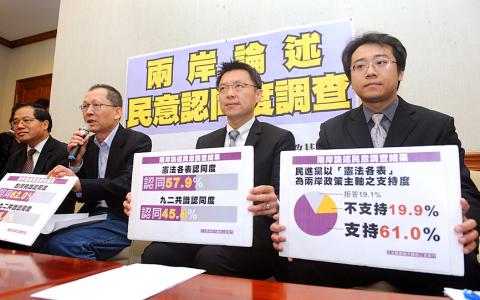An opinion poll released yesterday showed that former premier Frank Hsieh’s (謝長廷) initiative of “two constitutions, different interpretations (憲法各表)” has stronger support than the so-called “1992 consensus” advocated by the Chinese Nationalist Party (KMT) and Beijing.
While 57.9 percent of the respondents said they supported Hsieh’s proposal, 45.4 percent of those polled supported the “1992 consensus,” Harbor Cities Exchange Foundation executive director Chan Chao-tsung (詹昭聰) said at a press conference in Taipei.
Hsieh’s proposal has bipartisan support, winning recognition from 60.9 percent of those who identified as pan-green supporters and 70.9 percent of pan-blue supporters.

Photo: Liao Chen-huei, Taipei Times
“The results show that [Hsieh’s initiative] has the potential to become the consensus of the Taiwanese people,” said Democratic Progressive Party (DPP) Legislator Chao Tien-lin (趙天麟), who is close to Hsieh, adding that the initiative could become “version 2.0 of Taiwan’s China policy.”
The poll found that 61 percent of respondents supported Hsieh’s proposal becoming the DPP’s formal China policy, including 84.9 percent of pan-green supporters.
Chao said “two constitutions, different interpretations” was favored over the 1992 consensus, which was relatively unpopular among the 20 to 39 age group and in the south, because of its pragmatism and was seen as being better than the DPP’s past proposal of “name rectification and new constitution,” which many dubbed as provocative.
The poll, conducted between Thursday last week and Sunday, collected 1,071 valid samples and had a margin of error of 3.01 percentage points.
Decreasing support rates for the 1992 consensus showed the public’s disappointment with and suspicion of President Ma Ying-jeou’s (馬英九) cross-strait policies, National Sun Yat-sen University professor Lin Wen-cheng (林文程) said.
“Ma should take note of his disconnection from mainstream public opinion,” Lin said.
Responding to the survey, Hsieh said at a separate setting yesterday that he was glad the initiative has won majority support.
“I’ve been criticized a lot over the initiative, but the results show that it has the support of 61 percent of Taiwanese, with Washington viewing it acceptable and Beijing seeing it as tolerable,” Hsieh said.

Chinese spouse and influencer Guan Guan’s (關關) residency permit has been revoked for repeatedly posting pro-China videos that threaten national security, the National Immigration Agency confirmed today. Guan Guan has said many controversial statements in her videos posted to Douyin (抖音), including “the red flag will soon be painted all over Taiwan” and “Taiwan is an inseparable part of China,” and expressing hope for expedited reunification. The agency last year received multiple reports alleging that Guan Guan had advocated for armed reunification. After verifying the reports, the agency last month issued a notice requiring her to appear and explain her actions. Guan

GIVE AND TAKE: Blood demand continues to rise each year, while fewer young donors are available due to the nation’s falling birthrate, a doctor said Blood donors can redeem points earned from donations to obtain limited edition Formosan black bear travel mugs, the Kaohsiung Blood Center said yesterday, as it announced a goal of stocking 20,000 units of blood prior to the Lunar New Year. The last month of the lunar year is National Blood Donation Month, when local centers seek to stockpile blood for use during the Lunar New Year holiday. The blood demand in southern Taiwan — including Tainan and Kaohsiung, as well as Chiayi, Pingtung, Penghu and Taitung counties — is about 2,000 units per day, the center said. The donation campaign aims to boost

The Kaohsiung Tourism Bureau audited six hotels in an effort to prevent price gouging ahead of Korean band BTS’ concert tour in the city scheduled for Nov. 19, 21 and 22 this year. The bureau on Friday said that the audits — conducted in response to allegations of unfair pricing posted on social media — found no wrongdoing. These establishments included the local branches of Chateau de Chine, Hotel Nikko, My Humble House, and Grand Hai Lai, it said, adding that the Consumer Protection Commission would have penalized price gougers had the accusations been substantiated. The bureau said the Tourism Development Act

The Central Weather Administration (CWA) said a magnitude 4.9 earthquake that struck off the coast of eastern Taiwan yesterday was an independent event and part of a stress-adjustment process. The earthquake occurred at 4:47pm, with its epicenter at sea about 45.4km south of Yilan County Hall at a depth of 5.9km, the CWA said. The quake's intensity, which gauges the actual effects of a temblor, was highest in several townships in Yilan and neighboring Hualien County, where it measured 4 on Taiwan's seven-tier intensity scale, the CWA said. Lin Po-yu (林柏佑), a division chief at the CWA's Seismological Center, told a news conference